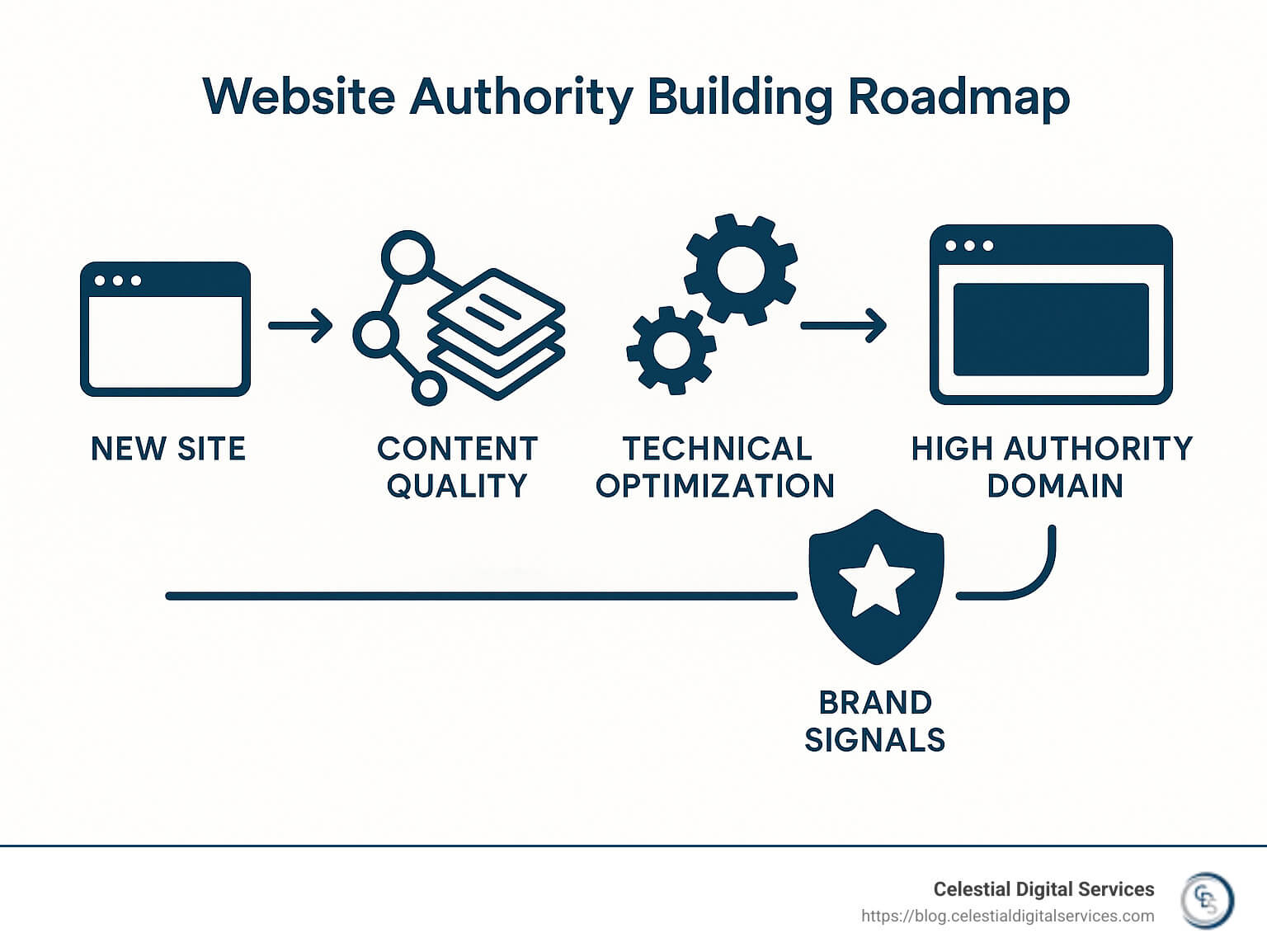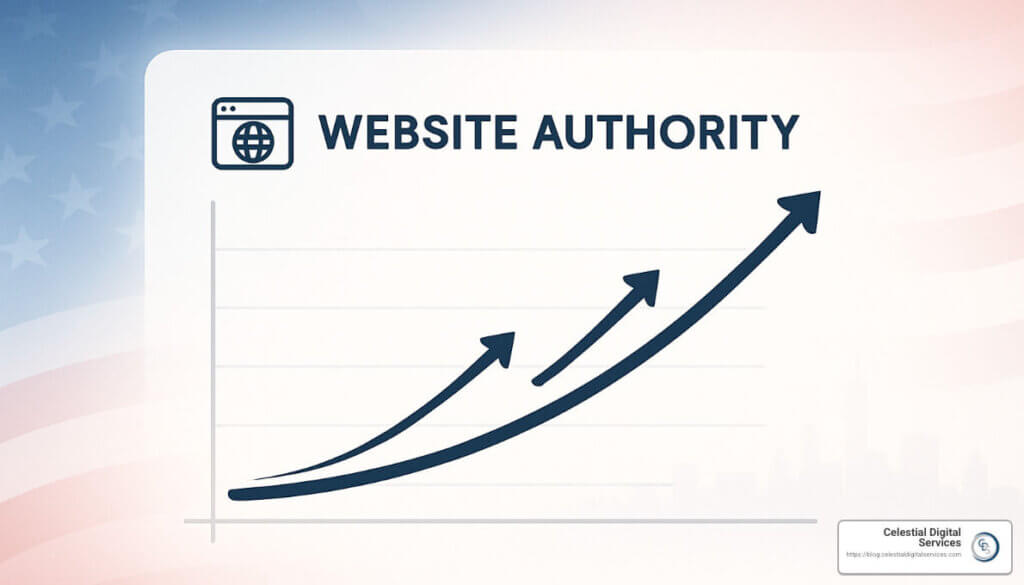The Website Authority Advantage: Your Roadmap to Better Rankings
When I talk with clients about their SEO goals, the conversation inevitably turns to authority. It’s the digital equivalent of your business’s reputation – something that takes time to build but pays dividends for years to come.
To increase website authority, you need a strategic approach rather than random tactics. Think of it as building a house: you need a solid foundation, quality materials, and expert craftsmanship. In the digital world, this translates to creating exceptional content, earning quality backlinks, and maintaining technical excellence.
Website authority isn’t an official Google ranking factor, but it strongly correlates with better search visibility. Much like academic citations improve a researcher’s credibility, quality backlinks from respected sites signal to search engines that your content deserves attention.
Domain authority scores typically range from 1-100, with new sites starting at the bottom. Here’s the good news: the scale is logarithmic, meaning it’s much easier to climb from 20 to 30 than from 70 to 80. This gives newer sites a real opportunity to see meaningful progress with the right strategies.
Why should your business care about website authority? Because it directly influences:
- How quickly you can rank for competitive keywords
- Your resilience during algorithm updates
- The effectiveness of your content marketing efforts
- Your overall search visibility and traffic potential
After helping dozens of businesses increase website authority over the years, I’ve identified seven proven strategies that consistently deliver results:
Building high-quality backlinks from relevant, reputable sites acts as votes of confidence from the digital neighborhood. Creating exceptional, original content naturally attracts links and engagement, while optimizing technical SEO ensures search engines can easily access and understand your site.
Developing strong internal linking helps distribute authority throughout your site, and removing toxic backlinks protects your site from penalty risks. Maintaining consistent content updates signals relevance, while establishing brand signals and social proof reinforces your authority beyond traditional SEO metrics.
The beauty of authority building is its compound effect – each improvement supports the others, creating sustainable growth that withstands algorithm changes and competitive pressure.

Want to dive deeper into specific strategies? Check out our guides on how to build quality backlinks, steer Google algorithm updates, and implement effective SEO tactics that will help strengthen your site’s authority.
Increasing website authority isn’t about quick fixes – it’s about building a digital asset that appreciates in value over time. With patience and consistent effort, even newer sites can develop the authority needed to compete in challenging niches.
Website Authority 101: Metrics & Why They Matter
When you hear “website authority,” think of it as your site’s online reputation score. It’s not an official Google rating, but rather a set of metrics created by SEO tools to help us understand how strong a website might be in search results.
Let’s talk about the three authority metrics that matter most in the SEO world:
| Metric | Provider | Scale | Key Factors | Update Frequency |
|---|---|---|---|---|
| Domain Authority (DA) | Moz | 1-100 | Link quantity, quality, root domains | Monthly |
| Authority Score (AS) | Semrush | 1-100 | Link power, organic traffic, spam factors | Regular |
| Domain Rating (DR) | Ahrefs | 1-100 | Number and quality of backlinks | Regular |
Good news if you’re just starting out! These metrics use a logarithmic scale – meaning jumping from DA 20 to 30 is much easier than climbing from 70 to 80. It’s like fitness – those first improvements come quicker than later ones.
As Semrush themselves point out, “Authority Score is not a ranking factor.” This is true for all these metrics – they’re helpful predictors, not actual Google ranking signals. Think of them as educated guesses based on many of the same factors Google likely considers.
How the Algorithms Score Your Site
These authority metrics aren’t just random numbers – they’re calculated using sophisticated algorithms that look at your site’s overall health and connections.
While each tool has its secret sauce, they generally examine your link power (how many quality websites point to yours), the number of different root domains linking to you (100 links from 100 different sites beats 1,000 links from just 10 sites), and various machine learning signals that identify patterns of high-performing websites.
They also check for spam factors – those shortcuts and tricks that might temporarily boost your numbers but ultimately hurt your site. It’s like a credit score for your website – built on a history of good behavior and positive relationships.
Why Authority Drives Visibility
Having strong website authority is like having a good reputation in your community – it opens doors. Sites with higher authority typically enjoy several advantages:
Trust is perhaps the biggest benefit. Search engines aim to deliver trustworthy results, and authority metrics help predict which sites users can rely on.
Higher authority sites also tend to get a larger SERP share – meaning they appear more frequently in search results for relevant topics.
When you’re battling for competitive keywords, authority gives you a competitive edge. Two sites with similar content? The one with higher authority often wins.
Finally, authority creates a virtuous cycle of content amplification – when you publish something new, higher authority means it’s more likely to be found, shared, and linked to, further boosting your authority.
I’ve seen this with clients – one small business increased website authority from DA 32 to 41 over eight months through consistent quality content and strategic outreach. Their organic traffic doubled during that same period, showing how these “just metrics” translate to real business results.
While these numbers are helpful guides, they’re part of a bigger picture. Focus on building genuine value and connections, and the authority scores will follow naturally.
Free Ways to Measure & Benchmark Your Authority
You don’t need to break the bank with expensive SEO tools to keep tabs on your website’s authority. Several free options give you valuable insights without costing a dime.
Moz Link Explorer offers a handful of free searches each month to check your Domain Authority score. Similarly, Semrush’s Domain Overview provides a snapshot of your Authority Score with their free account tier. If you prefer Ahrefs, their Website Authority Checker allows limited free Domain Rating checks.
Don’t overlook Google Search Console — while it doesn’t directly provide an authority score, it shows something even more valuable: your actual search performance in Google’s index. This real‑world data often tells you more about your site’s standing than third‑party metrics.
Context is everything when measuring authority. A local plumbing business with a DA of 30 competing against other local companies with DAs between 25‑35 is actually in great shape, even though that 30 might seem unimpressive compared to giants like Amazon (DA 96) or Wikipedia (DA 98).

Tools & Tactics for Quick Checks
For busy business owners who need simple monitoring solutions, several lightweight options exist that won’t disrupt your workflow.
Browser extensions like MozBar or Semrush’s SEO Writing Assistant can show you authority metrics instantly while you’re browsing competitors or checking your own site. These tools sit quietly in your browser until you need them.
Many SEO platforms offer free versions of their authority checkers with limited daily uses — perfect for small businesses that just need occasional checks. For a more organized approach, set up a simple spreadsheet to track your authority scores monthly alongside other key metrics like organic traffic or keyword rankings.
One approach we often recommend to our clients is competitive benchmarking. Rather than obsessing over absolute numbers, track how your authority compares to 5‑10 direct competitors over time. This relative measurement often provides more actionable insights than watching your own score in isolation.
Increasing website authority is a marathon, not a sprint. Regular monitoring helps you spot trends and make strategic adjustments. For deeper insights into tracking your search presence, our guide on Google Search Console Tips covers additional tactics.
Setting a ‘Good’ Score in Your Niche
There’s no universal “good” authority score — it depends entirely on your industry and competition. That said, here are some general benchmarks to give you context:
Sites with DA 1‑20 are typically new or small websites, perhaps local businesses just starting their online journey. The DA 20‑40 range usually includes established small businesses and growing blogs that have been building authority for a while.
A DA of 40‑50 is actually average for established businesses with solid SEO practices in place. When you reach DA 50‑60, you’re among industry leaders with well‑optimized sites. Anything above DA 60 typically belongs to major publications, global brands, and recognized authority sites.
The most useful benchmark isn’t some arbitrary number — it’s how you stack up against direct competitors ranking for your target keywords. If the average DA of sites ranking on page one for your primary keywords is 35 and your site is at 25, you have a clear and achievable target to aim for.
Authority growth follows a logarithmic curve — it’s significantly easier to increase from DA 10 to 20 than from DA 50 to 60. Set realistic targets based on your starting point and competitive landscape, and celebrate the small wins along the way.
Increase Website Authority: 7 Proven Strategies
Now that you understand what website authority is and how to measure it, let’s explore the strategies that will help you increase website authority effectively. Think of these tactics as pieces of a puzzle – when combined, they create a complete picture of authority that search engines can’t ignore.
Increase Website Authority with High-Quality Backlinks
Backlinks are like votes of confidence from other websites. The more respected sites that link to you, the more search engines trust your content.
Building high-quality backlinks takes work, but the payoff is worth it. Start by creating truly link-worthy content – original research, comprehensive guides, or interactive tools that naturally attract links. One of our clients created an industry statistics page that earned links from over 50 authoritative domains in just six months.
Guest blogging still works wonders when done strategically. Backlinko secured a guest post on a DA92 site that generated over 80 backlinks and significantly boosted their rankings. The key is choosing relevant sites where your target audience already hangs out.
Digital PR through platforms like HARO (Help A Reporter Out) can land you mentions in major publications. We’ve helped clients earn links from news outlets with DA scores above 85 just by responding thoughtfully to journalist queries.
Quality always trumps quantity in link building. One backlink from a trusted, relevant site in your industry carries more weight than dozens of links from obscure, unrelated websites.
Want to dive deeper into effective link building? Check out our guide on how to Build Quality Backlinks.
Content Excellence to Increase Website Authority
Content is the foundation of authority building. Without exceptional content, your other efforts simply won’t stick.
To create authority-building content, focus on demonstrating E-E-A-T (Experience, Expertise, Authoritativeness, and Trustworthiness). Show your credentials, cite reputable sources, and share genuine experiences that help your audience.
Statistics pages are surprisingly powerful link magnets. Backlinko’s research found that their stats pages earned 32.17% of their high-quality backlinks despite making up only 16% of their published content. People love citing hard data!
Original research takes work but pays dividends in authority building. When you’re the source of new industry insights, others naturally link to and reference your findings. One of our clients conducted a survey of 500 industry professionals and turned the results into an annual report that became their biggest source of backlinks.
Don’t forget to update your content regularly. Freshness matters, especially for topics that evolve quickly. Set a calendar reminder to review and refresh your most important pages every 6-12 months.
Above all, create content for people, not search engines. As Google’s own quality standards emphasize, helpful content that thoroughly addresses user needs will naturally perform better over time.
Strengthen Internal Linking & Site Structure
Internal linking is like the circulatory system of your website – it distributes authority throughout your pages and helps search engines understand what matters most.
Topic clusters work beautifully for organizing content and distributing authority. Create comprehensive pillar pages on your main topics, then link to and from more specific articles that explore subtopics in depth. This structure signals to search engines that you have authoritative coverage of the subject.
Use descriptive anchor text for your internal links instead of generic phrases like “click here.” When linking to your guide on local SEO, use anchor text like “local SEO strategies” rather than “read more.”
Keep your most important pages close to your homepage in terms of clicks. We call this “crawl depth,” and it matters. One e-commerce client saw their product pages jump in rankings after we restructured their navigation to reduce crawl depth from 5 clicks to just 2.
A logical site architecture isn’t just good for SEO – it helps visitors find what they need. When users stay longer and engage more, those positive user signals reinforce your authority.
For advanced internal linking strategies that can dramatically boost your site’s authority, check out our guide to Effective SEO Tactics.
Identify & Remove Toxic Links
Not all backlinks help your authority – some actually harm it. Think of toxic links as bad company that makes others question your reputation.
Regular backlink audits are essential housekeeping for authority building. Tools like Semrush’s Backlink Audit can help you spot potentially harmful links that might be dragging down your authority.
When evaluating links, watch for warning signs: sites with no real content, completely unrelated niches, suspiciously optimized anchor text, or high spam scores. These links can trigger Google’s spam filters and hurt your authority.
For toxic links, you have two options: reach out to the site owner requesting removal, or use Google’s Disavow Tool as a last resort. As Semrush wisely cautions, “Google says the disavow tool is a very advanced feature and must be used with utmost caution.” Only disavow links that are clearly manipulative.

Set up alerts for new backlinks so you can catch potential issues early. Prevention is always easier than cleanup.
Technical SEO Tune-Up
Technical SEO is like the engine under your website’s hood – visitors might not see it, but it powers everything else.
Site speed directly impacts both user experience and search rankings. According to Google’s research, when page load time increases from 1 to 3 seconds, the probability of bounce increases by 32%. We’ve seen dramatic authority improvements for clients who prioritized speed optimization.
With Google’s mobile-first indexing, your site must shine on smartphones and tablets. This isn’t optional anymore – it’s essential for authority building. Check how your site performs on various devices and screen sizes regularly.
HTTPS security is now standard for trustworthy sites. If you haven’t made the switch from HTTP, do it immediately – it’s a clear trust signal for both users and search engines.
Core Web Vitals measure real-world user experience metrics including loading performance (LCP), interactivity (FID), and visual stability (CLS). One e-commerce client increased their Domain Authority from 32 to 41 within six months after addressing these technical factors.
Want to boost your site’s performance? Check out our detailed guide on how to Optimize Website Speed.
Leverage Social Proof & Brand Signals
While social signals aren’t direct ranking factors, they contribute significantly to your overall brand authority, which indirectly influences your website’s authority.
Consistent brand presence across all platforms strengthens recognition and trust. Use the same voice, visual elements, and messaging whether someone finds you on your website, social media, or business directories.
Active engagement on social platforms builds community around your brand. This isn’t about collecting followers – it’s about creating genuine conversations that reinforce your expertise and trustworthiness.
Claiming and optimizing your Google Knowledge Panel gives you more control over how your brand appears in search results. This prominent display of verified information significantly boosts perceived authority.

Brand mentions, even without links, matter increasingly in Google’s evaluation of your authority. As search algorithms evolve, they’re getting better at understanding entities and brand connections beyond just hyperlinks.
Future-Proof with Continuous Monitoring
Authority building isn’t a one-and-done project – it’s an ongoing journey that requires attention and adaptation.
Track your authority metrics monthly to identify trends and measure progress. Is your DA, AS, or DR increasing over time? Are there sudden drops that need investigation? Regular monitoring helps you spot both opportunities and warning signs.
Keep an eye on your competitors’ authority too. If you notice a competitor’s score jumping significantly, investigate what they’re doing right – there might be tactics worth adapting for your own strategy.
Google’s algorithm changes constantly, so stay informed and ready to pivot. What worked beautifully last year might need refinement today. At Celestial Digital Services, we help clients steer these changes by focusing on sustainable, white-hat strategies that stand the test of time.
Content decay is real – even your best-performing pages will gradually lose effectiveness without regular updates. Schedule quarterly content audits to identify pages that need refreshing, consolidating, or expanding.
By consistently monitoring and adapting your authority-building efforts, you’ll build sustainable search visibility that continues to drive results year after year.
Common Questions About Website Authority
How long does it take to see improvements?
Building website authority isn’t a sprint – it’s definitely a marathon. When clients ask me about timelines, I’m always honest about what to expect:
For most websites, you’ll start seeing measurable improvements in your authority metrics after about 3-6 months of consistent effort. More significant authority gains that actually translate to better rankings typically take 6-12 months. If you’re aiming to build substantial authority that helps you compete for those tough, competitive terms, you’re looking at a 12+ month journey.
I remember working with a local business owner who was initially disappointed by the slow progress. Their site went from a DA of 11 to 28 over nine months, but what’s interesting is that the biggest jumps happened between months 4-7, after we’d laid all the groundwork. They were thrilled once those gains started showing up in their actual traffic numbers!
Your timeline will vary based on where you’re starting from (lower scores tend to improve faster), how competitive your industry is, how consistently you’re implementing your SEO strategy, and frankly, what resources you’re able to commit.
As Brian Dean of Backlinko puts it, “Building authority for your domain is HARD.” There simply aren’t shortcuts or overnight solutions that deliver lasting results. Patience isn’t just a virtue in SEO – it’s a requirement.
Is website authority a direct Google ranking factor?
Let’s clear this up once and for all: metrics like Domain Authority, Authority Score, or Domain Rating are not direct Google ranking factors. These are third-party metrics created to help us predict how well a site might perform in search results.
That said, don’t dismiss these scores entirely! Many of the factors these metrics measure – particularly your backlink quality and quantity – are indeed ranking signals that Google does use. John Mueller from Google has even acknowledged that while they don’t use Domain Authority specifically, there is still a “sitewide score that maps to similar things.”
Think of authority metrics as helpful proxies that give you insights into your competitive strength. They’re like a thermometer that helps measure your SEO health, even if Google isn’t looking at that specific thermometer.
How often should I track my score?
In my experience, checking your authority metrics once a month hits the sweet spot for most websites. This frequency lets you:
- Identify meaningful trends without becoming obsessed with daily fluctuations
- Connect changes in your authority to specific SEO activities you’ve implemented
- Make smart, data-informed decisions about your strategy
Since Moz typically updates Domain Authority scores approximately once per month anyway, checking more frequently won’t give you new information – just more anxiety!
These metrics can fluctuate for reasons completely outside your control. The tool might update its algorithm, your competitors’ link profiles might change, or there might be variations in the tool’s link index.
What truly matters is the long-term trend rather than any short-term ups and downs. As one of my favorite SEO colleagues likes to say, “Domain authority predicts success, but it doesn’t guarantee it.”
Focus on building real value through quality content and ethical link building, and the authority scores will follow – along with the rankings and traffic you’re really after.
Conclusion
The journey to increase website authority is truly a marathon, not a sprint. Like tending a garden, it requires patience, consistent care, and the right approach to yield beautiful results. Throughout this guide, we’ve explored the many facets of building a strong digital reputation that search engines – and more importantly, your audience – will respect.
Authentic authority can’t be manufactured overnight. The sites that dominate search results have typically spent years cultivating their reputation through consistently valuable content and meaningful connections with other websites.
Think about your authority-building efforts as creating a virtuous cycle: better content attracts more quality links, which increases your authority, which improves your rankings, which brings more visitors, which creates more opportunities for links… and the cycle continues.
What I’ve seen work time and again with our clients at Celestial Digital Services is a holistic approach that addresses all aspects of authority building:
Creating exceptional, genuinely helpful content that your audience actually wants to read and share. This means going beyond surface-level articles to develop resources that truly demonstrate your expertise and solve real problems.
Earning high-quality backlinks through relationship building and outreach – not by taking shortcuts that might harm your site in the long run. One thoughtful link from a respected industry website can outweigh dozens from irrelevant sources.
Maintaining a technically sound website that loads quickly, works flawlessly on mobile devices, and provides a seamless user experience. Technical issues can undermine even the best content strategy.
The businesses that succeed in building lasting authority are those that view SEO not as a set of tricks but as an extension of their overall business quality. They understand that increasing website authority ultimately comes down to becoming genuinely authoritative in your field.
At Celestial Digital Services, we’ve guided countless startups and local businesses through this journey, helping them build authority from the ground up with strategies custom to their unique goals and competitive landscape. We understand that what works for an e-commerce store won’t necessarily work for a local service business or a B2B software company.
Building true authority isn’t just about improving a number in an SEO tool—it’s about creating a stronger online presence that drives sustainable traffic, builds credibility with your audience, and ultimately contributes to your business growth.
Ready to lift your website’s authority and improve your search visibility? We’d love to help you develop a customized strategy that aligns with your business goals and competitive landscape. Visit our SEO pillar page to learn more about our comprehensive approach to search engine optimization.



